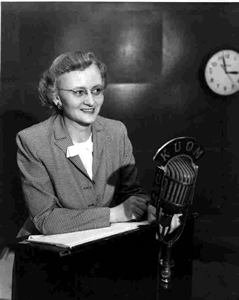The Templin Archive
A Prospective Longitudinal Data Set for Researchers in Child Speech and Language
 The Templin Archive is the repository of materials associated with a longitudinal study of 436 children undertaken by Mildred Templin, Ph.D. In 1960 Dr. Templin initiated a longitudinal study of four-year-olds living in Minneapolis, MN. Her initial goal was to determine which children identified as having speech difficulties just before kindergarten would need intervention in grade 2. When it turned out that many children had not normalized their speech by grade 2, she extended the study through grade 4. Later she returned to assess the children when they were in grade 11.
The Templin Archive is the repository of materials associated with a longitudinal study of 436 children undertaken by Mildred Templin, Ph.D. In 1960 Dr. Templin initiated a longitudinal study of four-year-olds living in Minneapolis, MN. Her initial goal was to determine which children identified as having speech difficulties just before kindergarten would need intervention in grade 2. When it turned out that many children had not normalized their speech by grade 2, she extended the study through grade 4. Later she returned to assess the children when they were in grade 11.
Dr. Templin grouped the participants based on phonological performance and then assessed the children twice yearly through fourth grade and again in eleventh grade, for a total of 12 assessment periods. Assessments covered many areas, including written and spoken language, cognition, reading, spelling, visual and auditory perception, personality, and parental and teacher input. A comprehensive description of the participants, the structure of the study, and the assessments performed is available for download.
See a comprehensive description of the archive
Many of the assessments of the participants, but not all, have been reduced to scores and subscores and have been entered into a database. Descriptions of the variables included in each major area of assessment are available for download. Also available are notes on the selection of participants in the study.
Download documents about each major area of assessment
The archive has already served as the basis for seven follow-up studies involving some of the participants.
See the list of follow-up studies
About Mildred C. Templin
Mildred C. Templin, Ph.D., is an emeritus professor in the Child Welfare Institute at the University of Minnesota. Prior to undertaking the longitudinal study, she published the seminal work in assessing children's speech and language, Certain Language Skills in Children (1957).
About the Archive at Kansas State University
In the late 1990s, Dr. Templin contacted Ann Bosma Smit, Ph.D., at Kansas State University and invited her to take the archive, none of which had been published in peer-reviewed journals, and publish what could be published from it. The physical archive (80+ boxes) moved to Kansas State University. In 2003, Prof. Smit took sabbatical leave to catalog and assess the archive.
Prof. Smit's assessment of the Archive was that the research represented a rare prospective longitudinal study, and that the quantity of data was such that it should be made available to researchers everywhere who might want to use it. The Archive will remain under Prof. Smit's directorship for several years. After that, the digital materials will go to the CHILDES Database.
Grant Support
The grants that originally funded this project came from what was then the Bureau of Research, Office of Education, in the U.S. Department of Health, Education, and Welfare. The preservation and cataloging of the Archive was made possible by a Personal Service Contract from the National Institute of Deafness and Communication Disorders (NIDCD) to Ann Bosma Smit, Ph.D., at Kansas State University.
The NIDCD contract supported the conversion of audiotapes made in kindergarten and in grade 11 to digital form. The contract also made possible the conversion of a paper printout of the existing data to digital form, currently a SAS database. Finally, the contract provided assistance in developing language analysis procedures based on CLAN (MacWhinney, 2000). Eventually, these data will be transferred to the CHILDES database (MacWhinney, 2000).
Reference
MacWhinney, B. (2000). The CHILDES project, Volumes I and II. Mahwah, NJ: Lawrence Erlbaum.
Issues Related to Confidentiality and Protection of Human Participants
At the time that Dr. Templin began her study, universities did not typically have structures in place for the protection of human participants in research. However, Dr. Templin invited parents by letter to bring their pre-kindergarten children for the initial assessment, and the fact that parents did so constituted implied consent. Later, when most of the children were in the eleventh grade, the children themselves provided written consent for the use of their data. At that time, some children or their parents refused to continue to participate and their grade 11 data were dropped from the data set.
The Committee on Human Subjects at Kansas State University has approved the work on getting the archive into forms that other researchers can use. It has also approved the dissemination of the data to other researchers with the understanding that participants will be identifiable only by the number assigned to them in the research project. Professor Smit has the only extant list relating participant ID number to the child's name and demographic information. This list is kept in a locked compartment at Kansas State University.